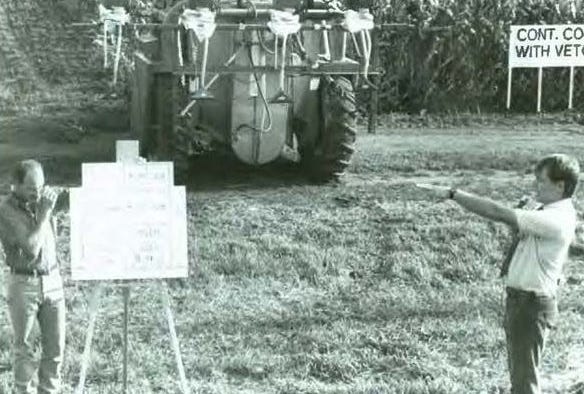
In early January, one of Nebraska Extension’s veteran soil scientists in crop nutrition retired from his duties at the Eastern Nebraska Research and Extension district and Haskell Agriculture Laboratory at Concord, Neb.
Over the past 34 years, Charles Shapiro has compiled a massive work of soil-related research and has seemingly been everywhere, speaking to farmers on soil health, fertilizer and manure management, and improved profitability from crop production.
With research interests focused on designing cropping systems that make effective use of materials used to improve crop nutrition and prevent environmental contamination, Shapiro is well known to producers, natural resources districts and conservation professionals across the state and around the region.
The New York native graduated from Cornell University in 1974, and received both his master’s and doctorate in agronomy from the University of Nebraska. After graduating with in 1982, Shapiro went to Ecuador and worked as a research scientist, before returning to Nebraska in 1984. Since then, he has worked his entire career in northeast Nebraska, based at HAL.
 WAY BACK WHEN: In this 1988 photo, Shapiro explains the aspects of a long-term tillage rotation experiment he was working on at the Haskell Agriculture Lab.
WAY BACK WHEN: In this 1988 photo, Shapiro explains the aspects of a long-term tillage rotation experiment he was working on at the Haskell Agriculture Lab.

We caught up with Shapiro recently and asked him to reflect on his long career in helping farmers improve practices in crop production.
After 34 years as a soils scientist on the job in Nebraska Extension, are there a few aspects of the job where you might say, “If only I knew then when I started what I know now?”
From the scientific perspective, I can easily say that when I started in this position, I did not appreciate how much I had to learn about all the aspects of soils. One never stops learning about the specifics of the biology, chemistry and physics of soil, so I appreciate the complexity much more, now. And we do know a lot more now than we did then.
But the important thing from the job perspective is that we, as Extension researchers and educators, are “change agents” as much as “knowledge brokers.” Anyone can type “N rate on corn” in a Google search and get a million hits. But the challenge is how do you decide which of those “hits” are applicable to your situation? We are not going to get producers to try new methods or re-evaluate old ones with a bunch of numbers and graphs. I don't know if I know the answer to this, but I know that we need to work on it.
What do you consider the most rewarding aspects of your career?
The most significant research project that had immediate impact was our work with the conversion of former Conservation Reserve Program land back into crop production from grass. There really was no other work like it anywhere, and we had a big project that answered some important management questions for producers. Over the longer term, bringing manure management into the realm of soil nutrition and not waste disposal will have the most impact.
I liked the collaborative work with others in Extension and other agencies working on programs that provided real information to help producers make decisions. I have tried to apply the scientific method and think strategically. It is nice to get a grant, have a paper published or have a nice article written in the media, but it is also great when we get feedback from a producer saying that some information we gave out really helped them."
What are your main take-home messages you hope farmers will never forget related to soil health?
The whole soil health issue has taken us soil scientists by surprise. It's not the importance of the soil that we did not see coming, but probably that we did not do enough to help bring it on. The thinking about soils as a critical factor in our agriculture is tremendous, and the one issue we don't want to forget is soil conservation. While it is great to grow “more green” and to stimulate the microbial biomass, if we don't have soil there in the future, we won't be able to do all these other good things for the soil. So the No. 1 issue is soil conservation.
I am proud of our research work that helped farmers make the land conversion out of CRP back into crop production, but I was also saddened that a lot of land that would be better suited for grass would once again become cropland. I recognize the financial realities that went into those decisions, but from a soil conservation perspective, we went backwards. Of course, if the land was farmed under tillage before it was enrolled into CRP and was farmed under a no-till system after it went back into crop production, that would be an improvement."
Read more about Shapiro's career at UNL Cropwatch.
About the Author(s)
You May Also Like






